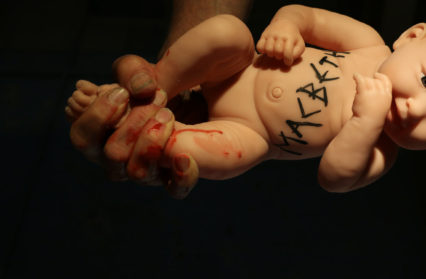Volcano’s Macbeth: Director’s Cut proves to us that the timeless Scottish play is really a piece about two characters. The intensity of the relationship between husband and wife coupled with the apparent non-essential peripheral characters really gives the classic tale a shot of vitality, a renewed relevance. Volcano’s production combines traditional text with Brechtian techniques, ensuring the audience don’t become overly empathetic towards the characters but providing us with perfect opportunity to reflect on the play’s major themes.
Initially produced in 1999, Volcano’s Director’s Cut was met with mixed reviews. From reading these reviews, it is obvious the production has since undergone a significant re-working, perhaps the most significant being the cutting of the parallels drawn between Macbeth and his Lady with Fred and Rose West (which I must admit, I would have liked to have seen). It is understandable why such an overt reference might be dropped, perhaps being difficult to give full attention to the original two characters of Macbeth and Lady Macbeth. This knowledge, however, does add another rich layer of interpretation to us as an audience, perhaps not one considered before when seeing a traditional production with a full cast. The production’s successor seems to be less primitive, more subdued, offering a more naturalistic feel. Whilst one may argue that this tamer version of the piece could mean less immersion, on the contrary, the piece offers a greater chance for the audience to contemplate and reflect, the desired response to Brecht’s Verfremdungseffekt.
Mairi Phillips is Lady Macbeth, a role unequivocally suited to her, much more so than Richard III, which she played in Omidaze’s 2014 production. Phillips is phenomenal in this piece, her charged physicality and her combination of comedy and affliction is utterly enthralling to watch. Her ability to slip from the comedic, crass character into some of Lady Macbeth’s most harrowing soliloquys is mesmerising. Macbeth is played by Alex Harries, best known perhaps to most of us as DC Lloyd Ellis in Y Gwyll/Hinterland. At times it feels as if Macbeth’s lines are being lost by Harries, but he manages to pick it up towards the death of King Duncan, really reaching a climactic madness during Banquo’s ghost scene. It’s unclear whether Harries is making the conscious choice to deliver some of Macbeth’s greatest lines monotonously, but it is juxtaposed with some terrifically rage-fuelled outbursts at other times.
The set is pleasingly bare, with sheets hanging from the ceiling over a bed and use of a screen on which to project images. This same scene is used to project a silhouette of Banquo’s ghost, but it is how they create this dinner scene which is particularly original. Throughout the play, there doesn’t seem to be any need for other actors; Phillips and Harries manage this perfectly well on their own. The difficulty comes however when considering how to successfully stage a pivotal scene in which other bodies are needed. At this point in the production, Phillips and Harries head out into the audience to source some party guests. This may seem like a simple idea, but it is difficult to recall it being done in any other recent production. It works seamlessly, with audience members reading essential lines off small chalk boards in front of them. This isn’t the audiences’ only role; we are witches too. Macbeth speaks to us as his ‘filthy midnight hags’, house lights shining brightly upon us.
The whole production is completely original and exciting. At the beginning of the piece, the absurdist concept is put to us: choice. Is it simply choice that makes us who we are? If we chose one option whilst another person choses the other, does that make one of us better and the other lesser so? Volcano’s production will certainly make you question and reflect on some existential quandaries, which is one reason why it is one of the best pieces of theatre you will see this year.












